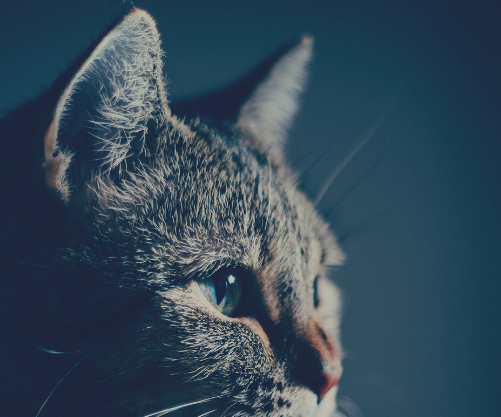Stovetop Gods: a story by D. A. Vorobyov
Happy New Year! I've brought you a gift! It's a delightful story featuring family, a cat, and the ups and downs of trying to navigate accepting your true identity.

Happy New Year! I've brought you a gift! It's a delightful story featuring family, a cat, and the ups and downs of trying to navigate accepting your true identity. This story was available for paid subscribers only until the 31st of December, 2021, at which point it became free for everyone to read. Thanks so much to everyone who supports me by subscribing for making it possible for me to share stories like this one!

Stovetop Gods
by D.A. Vorobyov
The first night in the new apartment is quiet. After the movers leave and you’ve called your parents to let them know you’re okay, it’s just you and King Baby and the boxes. As he sniffs around the place, occasionally releasing a confused meow, you unpack as much as you can. You set up his litter box and get through your first-night box. King Baby heaves his black-and-white bulk into the empty first night-night box and begins chewing on the cardboard while you pull a fitted sheet around the mattress on the floor. His purrs are almost louder than his crunching.
“You like it here?” you ask, and he blinks at you before climbing out of the box and shoving his head into your hand. You let go of the sheet and scratch him behind the ear. The purring gets louder. “Yeah, I guess you do.”
He looks up at you and meows again, and you glance at your phone for the time. “Point taken,” you say, and you both pick your way through the boxes to the kitchen. You have to hunt down a can opener, which King Baby doesn’t look happy about, but he seems to forget the delay as soon as the wet food makes it into his bowl. You place it on the floor for him with an exaggerated bow. “Your Majesty,” you say as he shoves past your hand to get to his dinner before it’s even made full contact with the ground.
Your own stomach growls, and as you wait for your takeout delivery, you push back the exhaustion already settling into your bones for one last, small box that you left on the kitchen counter. It’s all mugs, wrapped in newspaper and filled with little spice containers, except for the last one. You pull out the little straw statuette inside and turn it over in your hands. It was a housewarming gift from your grandmother, sent all the way from Russia when your mother had first told her you’d be moving away for graduate school.
Every house needs a domovoy, your mother had read from the letter Baba Masha sent with it. Its head was as large as its body, with friendly painted plastic eyes and a little yarn beard placed around a pleasant smile. For good luck. The letter is folded into the mug, too, and Baba Masha’s careful print marches across the page in slightly faded ink. You try to read it. You sound out the words to yourself, and you make it through a sentence before the discouragement settles thick and sour in your stomach, seasoned with guilt. Your mother tried so hard to make sure that you could read, and all you have to show for it is stumbling. You take it to your bedroom, fold it along the years-old creases in the paper, and tuck it into the back of your journal.
There was a domovoy sitting on your mother’s stove back home, perched above the dials and leaning against the wall. You place yours in the same spot and try not to think about it too hard.
There’s a knock on the door and you find yourself with heaping containers of sesame chicken and rice. You spend the rest of your night explaining to King Baby that you’d love to share, but the chicken is covered in sauce and deep fried, and that would be bad for him. In the morning, you find that he has taken his revenge by tearing open a garbage bag containing haphazardly packed winter clothing, leaving it strewn across the living room.
In a week you manage to unpack most of your boxes, order all of your textbooks, and email the local queer health clinic about finding a doctor. You find a coffee shop you like and scan a QR code on a flyer for a queer students’ group that looks interesting. You also find a desk from a local Buy Nothing group and order a couch you actually kind of like and can actually kind of afford, which feels like a miracle after eating dinner on the floor for six nights.
Unfortunately, that couch won’t get here for another four days, so it’s dinner on the floor again tonight as you fill out new patient paperwork in the glow of the IKEA lamp that has followed you from apartment to apartment. Your hands are cold on your laptop as you work, and your fingers hover over the trackpad. King Baby sniffs at your microwaved spicy noodles as you hesitate over the “gender” field on the form.
You settle on “nonbinary,” and it doesn’t feel true, but “male” feels like too much right now and your legal name, patronym and all, glares at you from the top of the form, though you haven’t found an alternative that fits better yet. King Baby keeps sniffing at your noodles, enticed by chicken-flavored broth, and you switch away from the half-finished tab to watch the rest of a YouTube video while you finish the bowl and try not to think too hard. King Baby climbs up over your crossed legs to settle into your lap and watch as your fork travels between bowl and mouth.
When it becomes clear that you’re going to disappoint him, he hauls himself back upright and goes to sniff petulantly at his own empty dish. The scene is so heartbreaking that you’re compelled to get up and find the cat treats and give him one.
You’re washing your meager dishes when the phone rings, and you rush to stack them in the drying rack before you answer.
Your mother’s face smiles at you from the phone, and you smile back. “Hi,” you say, fingers twisting in the hem of your sweatshirt.
“How are you? Show me the apartment, I want to see, did you get everything unpacked?” she asks in excited Russian, and you flounder for a bit before finally answering in English.
You take her around the apartment and show her all the ways you’ve started shaping it into more of a home. New sheets, books stacked creatively on the dresser and desk to make up for the temporary lack of a bookshelf. She says hello to King Baby, who perks up at her voice and sniffs happily at the phone. Your father looks over her shoulder and asks you whether you took pictures of everything in case your landlord wants to try anything fishy at the end of the lease. You work your way around the apartment and eventually find your way back to the kitchen.
“You like it so far?” she asks.
“Yes,” you respond. It’s true, the place is cozy. The cat has made himself at home. You’ll have a couch soon.
“Anything else?”
“What do you mean?”
“It’s been a week, you haven’t met anyone? Your classmates? You’ve been inside the whole time?” Her face falls. “You don’t want to tell me?”
You scramble for an answer. You don’t know how to say no, I haven’t, but I might go to a queer students’ group meeting next week. Instead, you say “It’s been quiet, school hasn’t started yet.” Guilt twists at your stomach, and you twist at the hem of your sweatshirt again. There had been a time when you didn’t carefully curate what you told her about your life, but there had also been a time when you didn’t look up transition timelines and worry about what to say when people asked about pronouns in class, or have to shove down a certain desperate sadness every time you see something about Russian anti-queer legislation online. “There just isn’t much to tell.”
She sighs heavily, but doesn’t keep asking, and you’ve never quite gotten used to the slight tinge of defeat that comes over her face in these conversations. Your mother pauses for a moment, peering at her screen. “What’s that?”
“What’s what? Something on your phone?”
“No, on the stove,” she says.
You look behind you--there’s nothing on the stove, you cook so infrequently that there’s actually a little dust already gathering on the dials. The only thing there is the domovoy, sitting a little askew. You glance at King Baby as you put the figurine back into place. The cat meows innocently and rubs against your leg. “The domovoy, from Baba Masha,” you say.
“Awww,”Your mother is smiling again, and you let yourself relax a little “I’m glad you remembered that--you should call her soon,” she says, and you’re tense again, thinking of your wavering Russian and the way that, despite your mother’s best efforts, you still can’t talk to her as if you’d grown up with her.
“I’ll call her soon,” you say.
“Very soon,” your mother says, and you feel about ten years old.
“Very soon,” you correct yourself. You’ll try, you promise yourself. You’ll even try to speak Russian for the whole call. “Love you, Mom,” you add. You swallow hard and force yourself not to clear your throat.
“Love you too,” she says, and you both hang up.
You spend the rest of the evening filling out the rest of the new patient forms, and before you send it, you scroll up and drop “he/him” in the “preferred pronouns” field. You submit the form before you can get scared and change it back.
The next morning, you find one of your boxes of cereal tipped over off the top of the fridge, emptied onto the floor, and one of the stacks of books knocked over into a messy heap on the dresser. The domovoy statue is askew again.
It’s more and more small things, one after the other--a dish slips off the counter, the drawers stick, you come back from your third day of classes to find that a glass of water you left on the coffee table is shattered on the floor. If you take King Baby’s purrs at face value, he definitely had nothing to do with it. You make an appointment with a vet anyway, which he seems to know about before you even finish the process. He sulks for half the evening, and you lure him out from under the couch with a trail of his favorite treats.
He crunches on them and brightens up slowly, and by the time he gets to you he allows you to give him a gentle scratch behind the ear.
“You okay?”
His response is to shove his head into your palm.
“I’m just worried about you, you didn’t do this before…”
He looks at you for a moment like he knows something you don’t, then goes back to demanding scratches and sniffing hopefully at the now-closed bag of treats.
You get back from the queer graduate students’ meetup and find out that your third-favorite coffee mug has broken inside the cabinet. King Baby jumps onto the counter and gives a soft and vindicated mmrrp.
The mug seems to have shattered in its spot, a neat pile of shards where its neighbors are still pristine. Your chest tightens as you clean the shards out of the cabinet, and the one-bedroom apartment suddenly feels too big and too quiet.
Nothing in the kitchen looks good, or maybe it’s just you. The whole room and everything in it feels bad in a way that makes the hair on your arms tingle, and you clean up as fast as you can. King Baby jumps down from the counter and rubs against your feet as you work.
The domovoy statue is crooked again. You don’t fix it on your way out of the kitchen. Instead, you go straight to the bedroom and leave the door just open enough that King Baby can follow you if he wants to. You take off your pants, wriggle out of your binder, and cocoon yourself in the comforter with your phone. The tingling feeling spreads to what feels like every hair on your body.
It’s like you’re watching your fingers move on their own as you type, “apartment haunted maybe?” into the search bar. The results offer you advice on selling a house that might be haunted, listicles on the ten spookiest houses you can buy, and one advertisement for a professional exorcist, which you almost click on before wondering what the threshold is for how bad a place has to feel before that decision would make sense.
You reason with yourself that if you have to think about it, you’re probably not there yet.
You end up on the Wikipedia page for haunted houses, which tells you that carbon monoxide poisoning is one of the main contributors to reports of haunted houses. That makes you a whole new flavor of afraid, until you remember that a gas leak doesn’t lead to mugs breaking in inexplicable ways.
A notification slides down the top of your screen, and you have no answer to your mother’s well-meaning “how are you?” Instead, you dismiss it with a twinge of guilt before scrolling further down the Wikipedia article. There’s a link to a “list of ghosts” and another to a “list of reportedly haunted locations in the world.” You open them both in separate tabs.
“List of ghosts” is organized by continent, and you scroll through headings and country subheadings and the names of each individual ghost. Some of them don’t have any names underneath, just links to other lists of ghosts in that area.
Your mother texts again. “Have you called your grandma? She asked me how you were doing…”
The guilt compounds on itself, and the combination of that and the fear makes you feel a little sick. You answer, finally, “I’ve been fine, I’ll call her soon--just been busy with school starting and finishing things up around the apartment.” It’s true, but it still feels like bullshit. You switch the keyboard to Russian for a moment and try to find more words, but the unfamiliar arrangement of Cyrillic letters leaves you hunting for letters in words you’re not entirely sure how to spell, and you switch back to your browser shamefully.
The door creaks open and you snap upright, sitting up so fast you pitch forward slightly. It’s just King Baby, and he looks at you for a long moment with accusatory yellow eyes before jumping up onto the bed and planting himself in the middle of a dip in the comforter. He unleashes a loud, plaintive meow.
You haul yourself out of bed and make yourself walk back to the kitchen. The Wikipedia article still shines on your screen, but so does the time, and just because you’re scared doesn’t mean the cat can go hungry. You dish out his wet food and get out of there as fast as you can.
On your way out, you find the domovoy lying face down sadly on the stove. You try to spend as little time in contact with it as possible as you put it back in place.
You have no appetite, but even if you did, the kitchen feels off-limits. Instead, you go back to the “list of ghosts.'' Most of the way down the page, “Supernatural beings in Slavic religion” catches your eye.
King Baby’s joyful chewing slices through the silence in the apartment, and the dusk outside thickens, and you scroll. The fear settles a little into a general unease as you read about forest and water nymphs and lake spirits. It makes you miss the cartoons your parents used to find on Russian websites for you to watch when you were a kid, the songs and the animation you’ve never seen anywhere other than those Soviet films your parents wanted to make sure you’d grow up knowing. There’s a whole separate article linked about the domovoy, how they protect the children and animals of the house. You’re glad someone is looking out for King Baby while you’re in class.
You go back to your bedroom and sift through your desk drawers, already cluttered, until you find your journal. You flip to the back and pull out Baba Masha’s letter. You have to sound out the words to yourself, slowly, as you read, but you manage to read all of it, and you savor the pride that you feel in that. At the end, she tells you that you’ll need to make him feel welcome in his new home, which you’re not sure how to do, but you know that it’s not letting it get knocked off its spot on the stove more nights than not.
Your stomach growls and you’re caught off guard by the return of your appetite in your...it isn’t newfound peace, but you’re nowhere near having to talk yourself down from hiring an exorcist. You think of potatoes and mushrooms, cooked with onions until they’re soft and perfect, like your mom made on dark winter days and like you remember your grandmother making sometimes, during the two visits you’re lucky to remember. You wander cautiously back into the kitchen.
You have none of those ingredients, and crestfallen is a strong word, but not overly so, for how you feel as you order delivery instead. Your phone buzzes with the receipt notification, and an email--from the queer health center, offering an appointment time.
You almost miss it--there’s a weird movement in the corner of your vision and a small thumping noise, so small it couldn’t have been King Baby. You turn around and find that the domovoy statuette has fallen from its spot again. It’s planted firmly on its feet, facing you. It isn’t looking at you. A little figurine can’t look at you. It can’t look at anyone, it’s made of straw and its eyes are painted plastic.
The pleasant smile that should be in its little yarn beard looks more like a disappointed frown. Your feet move independently, mechanically, as you herd King Baby into the bedroom and apologize to him for it, grab your keys, and get out the door.
It is 8:34 AM in Novosibirsk by the time you get back from the grocery store. Someone has left a bag of takeout at your doorstep, and you leave it in the fridge as you lay out your haul. The domovoy has not moved, does not move, and you can’t shake the feeling that it’s watching you as you line up the five potatoes, container of sliced mushrooms, single white onion, and garlic on the counter. It’s not hunger, it’s not even nostalgia that drives you to scrub the potatoes in the sink and place them on the cutting board. If you tried to explain it, even to yourself, you wouldn’t believe your own reasoning. You find your one knife and clumsily start to cut them into bite-size pieces. After the first potato, you take a deep breath, and before you can rethink it, before you can but your Russian isn’t good yourself out of it, you hit the camera icon under Baba Masha’s contact and prop up the phone against the electric kettle. It’s 8:46 AM in Novosibirsk, and she is definitely awake.
She picks up on the first ring. At first all you can see is the top of her head, and then she finds her glasses and looks up, beaming.
You stutter out hello, and how are you,and you get halfway through I’m sorry I didn’t call sooner before you start to doubt yourself and trip over the order of the words in the sentence.
She shakes her head and cuts you off. “No, no, no apologies,” she says. “I’m so happy to see your face, you look so different--did you cut your hair?”
You run a hand through your hair, which is shorter than she’s ever seen it, and end up slicking it back with potato juice by accident before giving her a sheepish “yes.”
“It suits your face, I like it,” she says warmly, and you relax. You start on the second potato.
“How are you--” you stutter, replace two words with one, and keep going. “How are you doing?”
“Oh, I’m good,” she says, still smiling. “The cucumbers are harvested, I’m going to start pickling them soon.” You remember seeing her garden for the first time--well, the first time you were old enough to remember it--the rows of cucumber and tomato plants, not a blade of lawn grass in sight.
Her neighbor’s daughter, Zoya, is back from university now, she says, and your cousins have finished their summer vacation. “You are starting your…” she trails off.
You flounder. “Not…” You realize you’ve never heard the word for “masters’ degree” in Russian. Potato number three passes through your knife, and you pull out a plate for the pile that’s quickly outgrowing the cutting board. “After college but not…not the one where I’m called Doctor when I finish it, the shorter one--” you keep trying, grateful for the potatoes to keep your hands occupied. You can’t be sure, and if you think about it too hard you’ll get even more lost in your attempt to explain what you mean, but the domovoy seems to have shifted a little closer to your workspace. “More college,” you finish sheepishly.
Baba Masha beams. “You’re so smart,” she says. “All my friends know, my granddaughter is so smart,” she adds, and you don’t correct her.
When you were preparing to study abroad during undergrad, there had been an info session on traveling while queer. Russia was not on the list of countries with legislation making it a particularly safe place for you.
Before you can come up with a response, she leans closer to her camera and squints at her screen. “What are you making?”
“Potatoes,” you say, “and mushrooms, I’m--” You pick up your phone while you search for the next words and switch the camera so that it’s showing the cutting board--you’ve moved on to the garlic now, and realize too late that your phone case will smell for days. “Trying to do it like you and Mom,” you finish. The words are coming a little easier now; you don’t sound fluent, but your tongue is remembering the shapes it needs to make.
Her smile widens and she says, “Hold on, let me find…” she trails off and carries her iPad with her as she goes to her own kitchen. You finish chopping the garlic as she looks for something, and you’ve started on half the onion when she comes back with an overstuffed journal. Its binding is falling apart and it’s bursting with what looks like clippings and notes. “My recipes,” she says, holding it up. She pauses while she flicks through it for a moment.
Your eyes sting. It’s the onion. You blink hard while she looks through the journal. “I’ll ask Zoya to make copies and help me send them,” she says.
“Ah--” You stutter and blink hard again. “You don’t have to do that--”
“I want to,” she says. “You live on your own now, you need your own book, you can start with these.” Her tone itself refuses argument, and you know better than to try.
“I--” you stutter again, and fuck, this onion has it out for you. King Baby rubs against your feet, and you don’t have to look for your next words, but your throat feels too thick for a moment to speak. “Thank you,” you say.
“Did you put out the domovoy?” she asks, and that feeling in your throat hardens into anxiety again. You hesitate. “I thought I saw--”
You nod. “Yes, I read somewhere--” you pause, correct yourself. “I read your letter, that you sent with it.” You know how you sound, but you can’t really backpedal now. “I read you have to make him feel welcome?” It comes out like a question. Your plan seems even more far-fetched when you say it out loud.
Baba Masha nods. “Right,” she says, but not like she agrees with you. You know what she means, that you’re doing right. “Leave some on a plate for him,” she advises.
You smile and glance at the statuette. It hasn’t moved from its spot facing the plate of raw potatoes. “I will,” you say, and she gives you an approving nod.
There’s a comfortable silence that lasts a few moments, and you feel yourself relax again. The onion seems to have finished with you, too, which feels good. You pull out a pan, drizzle some oil into the bottom, and put it on the burner to heat up.
“Thank you for calling,” Baba Masha says, her voice warm. “It’s so good to see you--”
“Wait,” you say quickly. “Please,” you add. You hear yourself, and you sound choked, desperate.
“What’s wrong?” Baba Masha leans closer to her screen, and her smile fades, replaced by a concerned frown.
“Baba Masha, I’m--” What are you doing, what the fuck are you doing, you think-- “Baba Masha, what if I wasn’t a girl?”
Her eyebrows knit together. “What?”
You scramble for the words, and you don’t have them. You don’t know the word for yourself in Russian.
You can’t take this back. You’re dimly aware of King Baby at your feet, meowing for a bite of potato. The pan has to be hot by now.
“Is everything alright?” Baba Masha picks up her screen to look at you closer.
Your tongue feels leaden in your mouth as you search for an explanation. “I’m--maybe…”Fuck, fuck-- “If I was your grandson instead, what if--” You pause again. “What would you think about that?”
Baba Masha puts her iPad down, is quiet for a few moments, and you’ve never felt more regret in your life before she finally says, “The next time I have tea with Zoya and her mother, I will say, my grandson is so smart, he’s just started another university course. That is what I think.”
You dump the onion and the garlic into the pan, and the sizzling would cover your awful, loud, wet sniff if Baba Masha weren’t right in front of you, watching your eyes water in a way you can’t blame on the onion. “Please don’t tell Mom yet?”
She’s smiling again, the expression soft and warm and you feel every mile of the nearly three thousand between you. She nods. “You tell her yourself, when you want.”
“Thank you,” you say. It feels brutally inadequate. “You don’t have questions?”
Baba Masha pauses for a moment before saying, “You are telling me something I just did not know about you before. I just want to know when you are coming back?”
Your eyes just will not stop watering as you add the mushrooms to the pan. From what you remember, your mom always cooked them until they were tiny, almost all their water evaporated. “I will talk to Mom about it,” you say. “I love you,” you add.
“I love you, too,” says Baba Masha, and her eyes are glistening too. She takes a deep breath and reaches into a kitchen drawer, pulling out an apron and putting it on. “These cucumbers will not pickle themselves,” she says. “I wish you health,” she adds, “and all of the luck. And you call me again soon, yes?”
“And you, too,” you say. “I will, I promise. And I’ll ask Mom about visiting.”
And then the call is over, and it’s you, and King Baby, and your rapidly shrinking mushrooms. You hesitate, but still pick up the domovoy and place it back in its correct spot. “I’m sorry,” you say. You repeat yourself in Russian, just in case. “I just don’t want you to get dirty?”
It looks back at you, and its mouth is a little flat line. At least it’s not a frown?
At some point, the mushrooms are done and you take them out, add more oil, and cook the potatoes. You have no idea how long it takes. Your vision swims occasionally, and every few minutes you have to wipe your cheeks dry.
The potatoes don’t taste quite like your mom’s, or your Baba Masha’s, but they’re close. They’re good.
Before you go to bed, you leave a spoonful out in the center of the stovetop on a small plate. The domovoy doesn’t move, and King Baby gives you an insistent meow.
“It’s not for you,” you say, “I’m sorry.” But by the time you finish speaking, he’s wandered off to the bedroom with his tail in the air, like he’s decided it’s time for the day to be over.
You wake up in the morning with King Baby’s warm weight pressed into your side, and when you go to make your coffee and feed him, the plate on the stovetop is empty.
The domovoy stands in his spot on top of the stove, and his painted plastic eyes are bright. He smiles at you.
________________________________________
D.A. Vorobyov was born in Russia and grew up in the southern United States. He has previously published work in Strange Horizons and Glittership. When they’re not writing, they can be found practicing fencing or playing video games.


